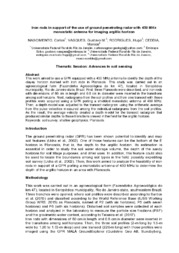Iron rods in support of the use of ground penetrating radar with 450 MHz monostatic antenna for imaging argillic horizon.
Iron rods in support of the use of ground penetrating radar with 450 MHz monostatic antenna for imaging argillic horizon.
Author(s): NASCIMENTO, C.; VASQUES, G. de M.; RODRIGUES, H. M.; CEDDIA, M.
Summary: This work aimed to use a GPR equipped with a 450 MHz antenna to identify the depth of the clayey horizon marked with iron rods in Planosols. This study was carried out in an agroecological farm (Fazendinha Agroecológica do km 47), located in Seropédica municipality, Rio de Janeiro state, Brazil. First, three Planosols were described, and iron rods with dimensions of 80 cm in length and 0.8 cm in diameter were inserted in the transitions among soil horizons. Next, radargrams from the soil profiles and from one transect with those profiles were acquired using a GPR porting a shielded monostatic antenna of 450 MHz. Then, a depth model was adjusted to the transect radargram using the arithmetic average from the pulse velocities measured among the individual radargrams from the soil profiles. As the result, the average velocity created a depth model for the transect radargram that produced similar depths to those transitions viewed in the field for the argillic horizon.
Publication year: 2022
Types of publication: Paper in annals and proceedings
Unit: Embrapa Soils
Keywords: Planosols, Planossolo, Reconhecimento do Solo, Shallow geophysics, Soil surveys
Observation
Some of Embrapa's publications are published as ePub files. To read them, use or download one of the following free software options to your computer or mobile device. Android: Google Play Books; IOS: iBooks; Windows and Linux: Calibre.
Access other publications
Access the Agricultural Research Database (BDPA) to consult Embrapa's full library collection and records.
Visit Embrapa Bookstore to purchase books and other publications sold by Embrapa.

